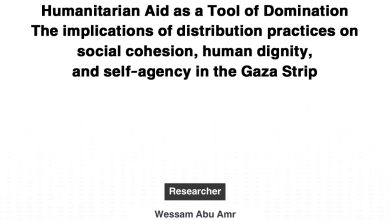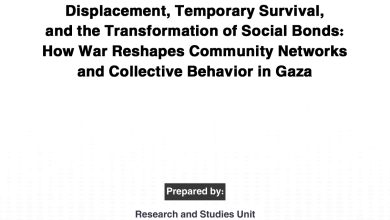New Study: Two Years since Sharm Elsheikh Donors Conference Reconstruction of Gaza Strip has not Resumed Yet

Gaza- Monday, 4 April 2011
In a conference held in Gaza, Pal-Think for Strategic Studies discussed the sectoral needs and the pledges of the donor countries for reconstruction. Six papers tackled the issue of reconstruction were introduced. Economists and civil society activists called for keeping the reconstruction of Gaza Strip away from the political agendas, and forming an independent committee to run it.
General Introduction:
After Israel’s three-week military aggression against Gaza Strip on (27/12/2008- 18/1/2009), an international conference to help reconstruct Gaza Strip got underway in Sharm Elsheikh on 2nd March 2009 within a participation of more than 80 states and organizations. Originally, the Palestinian Authority had hoped to raise $2.4 billion in aid, including $1.33 billion to rebuild Gaza Strip. However, the figures have exceeded expectations and the total figure comes to $5.2 billion. The most prominent participants were the united states , Gulf Arab states, the European Commission and Britain. Despite of the pledges of the participants and the sincere concern they showed, their pledges were conditioned with some political considerations. The participants denoted to the Palestinian reconciliation and having a truce or a settlement with Israel the matter which obstructed the implementation of the reconstruction and the fulfillment of their pledges.
After two years from this conference, Pal-Think for Strategic Studies found it necessary to review and assess the fulfillment of the donors’ pledges , and bring the issue of reconstruction back to the media as well. PAL Think for Strategic Studies is an independent non-profit, non-political, non-governmental and non-sectarian think and do tank that aims to stimulate and inspire rational public discussions and consensus for the well-being of the Palestinians and the Region.
Consequently, a conference entitled,” Two Years Since Sharm Elsheikh Donors Conference.. Reconstruction of Gaza Strip has not Resumed Yet” was organized on 4th April 2011 by Pal-Think for Strategic Studies as an activity in the project “Restoring Cooperation Amongst Community Actors towards Reconciled and Civilized Society” funded by the Swiss government. The conference aimed to discuss the issue of reconstruction and the pledges of the donors which have been given in Sharm Elsheikh donors conference in March 2009.
At the presence of a wide international and local media coverage dozens of academics, economists and civil society activists called for keeping the reconstruction of Gaza Strip away from the political agendas and self-interests, and forming an independent committee to run it.
The participants shed the light upon various sectoral needs for reconstruction, reviewed and evaluated the local and international, governmental and non-governmental efforts for reconstruction through presenting six productive papers. Most of the voices there called for not to subject the reconstruction to the political agendas and debates, and to form an independent agreed-upon committee to run and monitor the reconstruction.
The steering committee of the conference included significant and well-known Palestinian institutions such as Palestinian Businessmen Association, Palestinian Contractors Union, Palestinian Agricultural Relief Committee, Palestinian Federation of Industries and Al Azhar University-Gaza. Although the conference was held within the project “Restoring Cooperation Amongst Community Actors towards Reconciled and Civilized Society” funded by the Swiss government, the views in this report represent solely the researchers’ views and it does not necessarily reflect the view of Pal-Think for Strategic Studies or the Swiss government.
Summary:
The Sectoral Needs for Reconstruction
Khader Shinerwa, office director of the Palestinian Federation of Industries, reviewed the industrial sector’s needs and presented an analysis for the damages and their impacts on the industrial sector. He called the Palestinian authority (PA) to pay its due debts to the industrial sector and found programmes to support and reinforce the workforces. Also, he called for crystallizing and operating new economic agreements to support investment.
In a paper presented the needs of housing and infrastructure sector, Ayman Jomaa, representative of the Palestinian Contractors Union, said that the requirements for successful reconstruction embodied in: 1)Establishing a fund under the auspices of the government to provide contractors with soft loans without bank interests. 2)Enhancing the donors’ conditioned- finance in order not to assume complete control on implementing the projects.
For his part, Ali Abu Shahla, secretary of the Palestinian Businessmen Association, denoted that reconstructing factories should preceded reconstructing buildings to provide reconstruction with the basic materials. Concerning the mechanism of reconstructing the destroyed houses, he suggested giving the finance to the people in hand, according to specific standards and conditions, so they can implement their work freely.
He added that the government should have not removed the ruins and the rabbles for they were a witness on the last war. “using the tunnels for trading and bribing basic materials to Gaza eased the international pressure practiced on Israel to open the crossings”, Abu Shahla said. Concluding his speech, he recommended forming an agreed-upon committee to take the responsibility of reconstruction.
Regarding agriculture, Abed Alkareem Ashor, deputy of the Palestinian Agricultural Relief Committee(PARC), asserted that the Palestinian internal division is the main obstacle that obstructs reconstruction since this position makes donors cautious about sending their finance to Gaza Strip. He stated that the agricultural sector is linked with two main sources in dispute which are the land and the water. Unlike other sectors, the agricultural sector has not received a fund. Ashore suggested forming supreme national committee to monitor and run the process of reconstructing the agricultural sector besides passing new agricultural policy that considers the recent political, economic and social developments.
An Overview on the Ongoing Intervention Programs for Reconstruction
Omar Shaban, director of Pal-Think for Strategic Studies, presented a summary for the pledges and recommendations of Sharm Elsheikh donors conference and indicated that there is a mix between the finance guided to (PA) and the finance of the reconstruction. One of Sharm Elsheikh mistakes, according to Shaban, is that it did not put a clear mechanism for reconstruction.
Local programs for reconstruction:
Dr. Mo’een Rajab, former professor of political science in Al Azhar university, focused on the governmental and non- governmental local efforts exerted for reconstructing Gaza Strip; the maintenance and repairing process of many houses , buildings and public utilities. He recommended with: 1) gathering and investing the efforts of the local organizations, syndicates, profession unions and civil society organizations. 2) paying high attention to a central database provides us with accurate updated information about reconstruction. 3)ending the division and achieving the national reconciliation.
International programs for reconstruction:
Dr. Muhammad Meqdad, professor of political science in the Islamic university, focused on the governmental and non- governmental international efforts exerted for reconstruction. He said that the pledges of the conferences held for funding reconstruction were a mere ink on paper and conditioned with political considerations and the approval of Israel which is still besieging Gaza Strip and preventing raw materials to be in. Commenting on the Israeli decision of easing the siege, “The Israeli decision to ease the siege provided Gaza Strip with many Israeli food stuffs while the raw materials of reconstruction have not entered Gaza, yet” Meqdad said. He added that reconstruction shall not be limited to buildings but it should include reconstructing and rehabilitating the economic sector in general. He called for prosecuting the Israeli leaders because of the Israeli procedures which aggravate the crisis.
Download Report:





